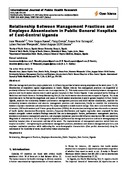| dc.contributor.author | Wananda, Irene | |
| dc.contributor.author | Byansi, Peter Kayiira | |
| dc.contributor.author | Govule, Philip | |
| dc.contributor.author | Katongole, Simon Peter | |
| dc.contributor.author | Wampande, Lillian Nantume | |
| dc.contributor.author | Anguyo, Robert DDM Onzima | |
| dc.date.accessioned | 2017-02-20T11:49:56Z | |
| dc.date.available | 2017-02-20T11:49:56Z | |
| dc.date.issued | 2015-11-17 | |
| dc.identifier.citation | Wananda, I., Byansi, K. P., Govule, P., Katongole, S. P., Nantume, W. L., Anguyo, R., Onzima, DDM., 2015. Relationship Between Management Practices and Employee Absenteeism in Public General Hospitals of East-Central Uganda. International Journal of Public Health Research, 3(6), pp. 374-383. | en_US |
| dc.identifier.uri | http://hdl.handle.net/20.500.12280/418 | |
| dc.description.abstract | Effective management practices play a pivotal role in influencing positive behavior among employees at the work place [1]-[2]. Absenteeism of employees signals organizational ill health. Studies indicate that management practices can negatively or positively influence the employee absence rate in an organization [3]. This study assessed the relationship between management practices and health worker absenteeism in public general hospitals in East Central Uganda. It was prompted by the findings of Medicines and Health Services Delivery Monitoring Unit [4] that health worker absenteeism was rampant in Uganda. The study objectives were: to find out the magnitude and causes of health worker absenteeism in public general hospitals in East Central Uganda, establish the relationship between performance management practices and health worker absenteeism, establish the relationship between attendance and absence management practices and absenteeism, finally to establish the relationship between employee motivation and absenteeism. The study employed a mixed research design. Data were collected from 46 key informants, 220 health workers and 3 focus group discussions (FGDs). An absenteeism tracking tool was also used as a measure of health worker absenteeism. Descriptive statistics, frequency distributions and logistic regression were employed for data analysis alongside content analysis. Findings revealed that socio-demographic factors, performance management practices; attendance and absence management practices; and employee motivation practices did influence absenteeism. We concluded that Magnitude of absenteeism is still of management importance (influenced by management practices and socio-demography) and varied by hospital, time of assessment and day of the week. The implementation of management practices varied from one hospital to another – strengthening the performance management practices; attendance and absence management practices; and employee motivation practices while addressing the socio demographic characteristics (that predict absenteeism) along the continuum of the hierarchy of needs could further reduce absenteeism. | en_US |
| dc.language.iso | en | en_US |
| dc.publisher | International Journal of Public Health Research | en_US |
| dc.subject | Management Practices | en_US |
| dc.subject | Relationship | en_US |
| dc.subject | Employee Absenteeism | en_US |
| dc.subject | Public Hospitals | en_US |
| dc.title | Relationship Between Management Practices and Employee Absenteeism in Public General Hospitals of East-Central Uganda | en_US |
| dc.type | Article | en_US |


